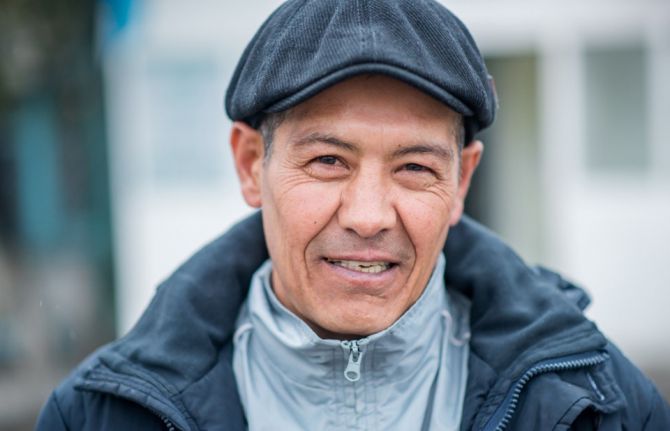

Feature Story
Bringing HIV services closer to people in Osh, Kyrgyzstan
14 June 2018
14 June 2018 14 June 2018Absamov Mannap Kamilovich works as a peer consultant in a primary health-care clinic in the city of Osh, in southern Kyrgyzstan. Mr Absamov injected drugs for more than 20 years, but, after a period of community-based treatment, stopped injecting and started a new life.
After taking an HIV test in 2013, Mr Absamov was asked to work as a peer consultant for a newly formed multidisciplinary HIV team.
In 2014, the first multidisciplinary HIV teams started work in southern Kyrgyzstan. They include a specialist in infectious diseases or a family doctor, a nurse and a peer consultant. The teams aim to improve the quality of medical and social services for people living with HIV and their families and are based in local health clinics.
The multidisciplinary HIV teams are supported by a grant from the Russian Federation through a regional cooperation programme that is implemented by UNAIDS in partnership with the Araket Plus nongovernmental organization. Ten multidisciplinary HIV teams have now been formed in Kyrgyzstan.
Mr Absamov works with up to seven clients a day, who go to a local clinic where they can access a comprehensive package of medical services.
Mr Absamov says that initially many people were afraid to visit the clinics, as they feared stigma and discrimination from medical personnel. “I had to persuade them, explain that it is possible to get all the medical services they needed at the local clinic.”
Ainagul Osmonova, the project manager, believes that people living with HIV have developed a genuine trust for their peer consultants.
The teams have helped to get people living with HIV on antiretroviral therapy. In 2013, only 285 people newly diagnosed with HIV started antiretroviral therapy. With the support of the multidisciplinary HIV teams, by the end of 2017 that number had increased to 885 people.
The peer consultants help the teams to recruit people living with HIV into the programme and to provide them and their families with access to social support services, which includes a psychological help desk for families and children affected by HIV. The peer consultants are in close contact with family members of people living with HIV and community organizations.
The multidisciplinary HIV teams work in close contact with the AIDS Centre in Osh. By moving many services for people living with HIV to the clinics, the role of the AIDS Centre has changed to focus more on coordination, training and seminars for general practitioners and the clinics’ medical staff.
According to the UNAIDS Country Director in Kyrgyzstan, Meerim Sarybaeva, the transfer of the AIDS Centre’s services to the primary health-care level has increased the overall coverage of clients enrolled in HIV treatment, care and support programmes. “Our experience shows that we should not be afraid of change. All people living with HIV and members of their families need to be able to access services where they live and be able to receive them freely, without experiencing stigma and discrimination,” she said.
Mr Absamov says he enjoys his job. Thanks to him, many people living with HIV have stopped using drugs, have started antiretroviral therapy and adhere to their treatment.


